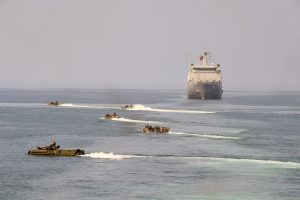Philippine President Ferdinand Marcos Jr. yesterday signed into law a bill that aims to develop a “robust and sustainable national defense industry” and to reduce its reliance on imported sources of arms and materiel.
The Self-Reliant Defense Posture Revitalization Act aims to make the Philippines less dependent on foreign supply chains and the interests of foreign countries.
The law is “a logical move forward for a country that finds itself at the fulcrum of geopolitical shifts and volatilities,” Marcos said in a live-streamed speech after signing the bill, Bloomberg reported.
The law will offer fiscal incentives to arms manufacturers, including tax breaks and government-backed financing, in order to promote local investments in defense technology and production, Marcos said, according to a statement from his office. The law will also seek “to give preference to Filipino-owned enterprises when it comes to the development, servicing, and operation of materiel in the country.”
Marcos said the new law will enable the Philippines to develop technologies to counter “unconventional threats” in the fast-evolving defense and security landscape.
“We will prioritize R&D to develop systems that meet our unique requirements to stay ahead of evolving threats, particularly asymmetrical threats that traditional systems may not be completely equipped to address,” Marcos said.
“It establishes a structured approach to defensive development, starting with research and production capabilities that align our defense sector with our strategic objectives,” he added.
The Philippines has a small defense industry capable of producing basic small arms, ammunition, and military vehicles, but currently lacks the capacity to produce more advanced military systems and remains reliant on major powers. But private arms manufacturers have long complained about the lack of fiscal support and political will to develop a robust domestic industry.
Marcos said that the law is designed to support the modernization of the Armed Forces of the Philippines (AFP), an ongoing program to revamp the military to transform it into a credible force capable of meeting the security challenges of the 21st century. The Revised AFP Modernization Program, currently in its third and final phase, has involved both the acquisition of weapons platforms and sought arrangements with foreign nations, including technology transfers, to support the development of the Philippines’ defense industry. Manila has allocated $35 billion for the Revised AFP Modernization Program.
In March, the Department of National Defense also adopted the Comprehensive Archipelagic Defense Concept, which envisions a shift from a focus on internal security operations – the AFP’s traditional focus, given the raft of insurgencies it has faced since independence – to external defense. The latter has become especially pressing over the past decade, as China has become more forceful in asserting its maritime and territorial claims in the South China Sea, particularly in waters claimed by the Philippines.
Since Marcos took office in mid-2022, Chinese and Philippine vessels have been involved in a series of skirmishes in contested waters, particularly around Second Thomas Shoal in the Spratly Islands. The signing of the new law came as the Philippine Navy began joint drills near Taiwan with counterparts from Australia, Canada, France, Japan and the United States.

































